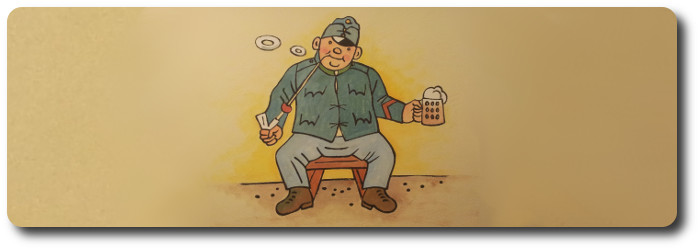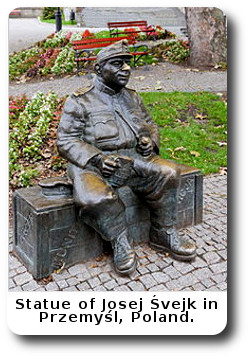Topic: Humour

Officers' Orderlies: Napoleons, Every One
The Good Soldier Schwiek, Jaroslav Hasek, 1930
 Officers' orderlies are of very ancient origin. It would appear that Alexander the Great had his batman. I am surprised that nobody has yet written a history of batmen. It would probably contain an account of how Fernando, Duke of Armavir, during the siege of Toledo, ate his batman without salt. The duke himself has described the episode in his Memoirs and he adds that the flesh of his batman was tender, though rather stringy, and the taste of it was something between that of chicken and donkey.
Officers' orderlies are of very ancient origin. It would appear that Alexander the Great had his batman. I am surprised that nobody has yet written a history of batmen. It would probably contain an account of how Fernando, Duke of Armavir, during the siege of Toledo, ate his batman without salt. The duke himself has described the episode in his Memoirs and he adds that the flesh of his batman was tender, though rather stringy, and the taste of it was something between that of chicken and donkey.
Among the present generation of batmen there are few so self-sacrificing that they would let their masters eat them without salt. And there are cases where officers, engaged in a regular life-and-death struggle with the modern type of orderly, have to use all possible means to maintain their authority. Thus, in 1912, a captain was tried at Graz for kicking his batman to death. He was acquitted, however, because it was only the second time he had done such a thing. On the other hand, a batman sometimes manages to get into an officer's good graces, and then he becomes the terror of the battalion. All the N.C.O.'s try to bribe him. He has the last say about leave, and by putting in a good word for anyone who has been crimed he can get him off. During the war, it was such batmen as these who gained medals for bravery. I knew several in the 91st Regiment. There was one who got the large silver medal because he was an adept at roasting geese which he stole. And his master worded the proposal in support of the decoration as follows:
"He manifested exceptional bravery in the field, showing a complete disregard for his own life and not budging an inch from his officer while under the heavy fire of the advancing enemy."
Today these batman are scattered far and wide throughout our republic, and tell the tale of their heroic exploits. It was they who stormed Sokal, Dubno, Nish, the Piave. All of them are Napoleons: "So I up and tells our colonel as how he ought to telephone to brigade headquarters that it was high time to get a move on."

